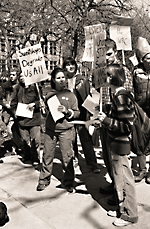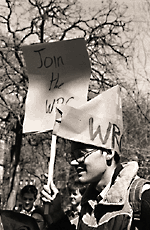Student
activists raise signs over sweatshops
>
> Mirroring activity on
campuses across the nation, a group of College students is calling
for the University to join a new sweatshop-monitoring coalition.
Citing tradition, the University declines.
 For
several years now, student activists nationwide have
pushed to find out whether
their colleges' sweatshirts, shorts, caps, and other official
apparel are made in overseas sweatshops. Their efforts--fueled
by the same skepticism of international trade practices on display
at recent protests in Seattle and Washington, D.C.--received
an added boost this spring with the establishment of the Worker
Rights Consortium (WRC), a national organization that plans
to monitor conditions at U.S. and overseas factories where college
merchandise is produced.
For
several years now, student activists nationwide have
pushed to find out whether
their colleges' sweatshirts, shorts, caps, and other official
apparel are made in overseas sweatshops. Their efforts--fueled
by the same skepticism of international trade practices on display
at recent protests in Seattle and Washington, D.C.--received
an added boost this spring with the establishment of the Worker
Rights Consortium (WRC), a national organization that plans
to monitor conditions at U.S. and overseas factories where college
merchandise is produced.
 |
| The
issue of sweatshop labor
has galvanized the nation's college students. |
The question of whether to join the WRC has sparked debate
on campuses across the country. After the University of Oregon
joined the WRC in response to student demands, Nike chairman
and CEO Philip H. Knight backed out of a planned $30 million
gift to help renovate the school's athletic stadium. Protests
or sit-ins have been held on other campuses, among them the
University of Iowa, Tulane, and Yale. Six students at Purdue
began a hunger strike on March 27 that ended ten days later
when school administrators agreed to accept provisional membership
in one or more sweatshop-monitoring groups.
At Chicago, the Student Government and the Anti-Sweatshop Coalition
(ASC), which represents 16 recognized student organizations
and their 200 members, requested in March that the University
join the WRC. After consulting with the Board of Trustees and
the Committee of the Council of the University Senate, University
administrators decided against joining the consortium. In a
March 30 letter to SG and ASC leaders, Arthur Sussman, the University's
general counsel and vice president for administration, wrote
that the decision was based on "our assessment of the material
we have received, our present licensing program, and the traditions
of the University."
Sportswear bearing the University name and logo, Sussman explained,
is sold primarily at the two locations of the University Bookstore
managed by Barnes & Noble. The chain, he said, requires its
clothing vendors to provide a statement that all merchandise
sold at any Barnes & Noble location is manufactured only in
facilities that comply with the standards of the Fair Labor
Association (FLA). The FLA--to which neither Barnes & Noble
nor the University belongs--was formed in 1996 as part of a
White House-backed effort to get businesses and labor and human-rights
groups to work together. The FLA is affiliated with more than
130 colleges and universities and--unlike the WRC--with several
major clothing manufacturers, including Nike, Adidas-Salomon,
Kathie Lee Gifford, and Reebok International. Its principles,
though, are similar to those of the WRC and generally ask companies
to ensure that their factories meet fair labor practices and
provide safe and healthy working conditions.
"To our knowledge no apparel items licensed by the University
are being made under conditions that do not meet these principles,"
Sussman wrote. Chicago's ASC leaders have been urging University
administrators for nearly three years to adopt a formal code
of conduct for licensing agreements. Holding rallies and circulating
petitions, the ASC activists--a core group of about 20, mostly
College, students--have embraced the fledgling WRC as the solution
to their concerns that the U of C's current system cannot guarantee
that merchandise bearing its name and logo is made under fair
labor standards.
ASC leader Rebecca Stark, a second-year, explains that as students,
"we are directly attached to the University because our financial
support goes to the U of C in the form of tuition, revenue from
books and T-shirts, and all sorts of other things. If we don't
like the way our university does business, we have a right to
question it and to ask for change."
 |
| Some
students want
the University to join the Worker Rights Consortium |
The 51 schools that had joined the New York-based WRC as of
May 10-including Brown, Columbia, Cornell, Georgetown, Berkeley,
and the University of Illinois--will require their licensees
to provide workers with a living wage, the right to organize,
and safe conditions. Member schools must also commit to full
public disclosure of factory locations and conditions and agree
to help fund the consortium. Institutions that collect royalties
from a licensing program are expected to contribute initial
dues of 1 percent of their previous year's licensing revenues,
up to $50,000; others contribute annual dues of $1,000.
It's the WRC's apparent intention to move beyond a monitoring
function to an advocacy role--supporting particular social,
political, and environmental positions--that troubles the University
administration and faculty, explained Sussman. He noted the
University's stance, outlined by the faculty in the 1967 Kalven
Committee Report on the University's Role in Political and Social
Action: "A university....is a community but only for the limited,
albeit great, purposes of teaching and research. It is not a
club, it is not a trade association, it is not a lobby."
Although the report does make exceptions for practices "'so
incompatible with paramount social values as to require careful
assessment of the consequences,'" Sussman wrote, "we do not
believe this to be the situation with our licensing program.
This statement is not a judgment on the importance of the need
for humane labor conditions in work settings, but rather recognition
that all providers of apparel under University licenses already
have pledged to honor a set of demanding workplace principles,
and that to join with other institutions to support a 'proper'
code of corporate behavior would be inconsistent with the Kalven
Report."
At the same time, Sussman told the students, there is strong
feeling that "the issues you have raised about labor and environmental
standards in overseas factories, the concept of the 'living
wage,' and their impact on matters of the global economy and
national public policy should be rigorously examined across
the University." To that end, Michelle Obama, associate dean
of student services and director of the University Community
Service Center, and Alison Boden, dean of Rockefeller Chapel
and resident master of Broadview Hall, were asked to arrange
educational forums with students on ASC concerns. Two lectures
on sweatshops, globalization, and universities took place in
May at Ida Noyes Hall.
While ASC leaders say they are pleased by the opportunity to
further campus discussion, they still take issue with the school's
reliance on Barnes & Nobles's assurances as a sufficient check
on sweatshop activity, arguing that the WRC is set up to play
the role of an independent, objective watchdog.
"Meeting and discussing has not proven to be enough to spur
change," says second-year and ASC leader Cara Kuball. "We must
foster a louder student voice on campus and make our presence
known. The University has responded that we don't know that
these violations exist in factories manufacturing U of C apparel.
This is true. It is even more reason to find out whether violations
are occurring and to end or prevent these violations."
--C.S.

![]()
 For
several years now, student activists nationwide have
pushed to find out whether
their colleges' sweatshirts, shorts, caps, and other official
apparel are made in overseas sweatshops. Their efforts--fueled
by the same skepticism of international trade practices on display
at recent protests in Seattle and Washington, D.C.--received
an added boost this spring with the establishment of the Worker
Rights Consortium (WRC), a national organization that plans
to monitor conditions at U.S. and overseas factories where college
merchandise is produced.
For
several years now, student activists nationwide have
pushed to find out whether
their colleges' sweatshirts, shorts, caps, and other official
apparel are made in overseas sweatshops. Their efforts--fueled
by the same skepticism of international trade practices on display
at recent protests in Seattle and Washington, D.C.--received
an added boost this spring with the establishment of the Worker
Rights Consortium (WRC), a national organization that plans
to monitor conditions at U.S. and overseas factories where college
merchandise is produced. 
